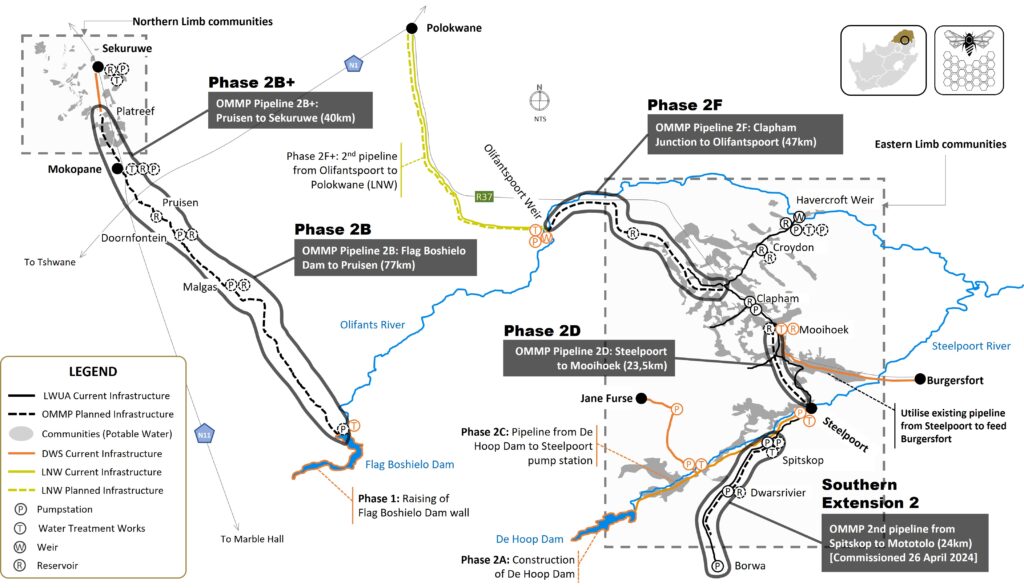Valued at R800 million in its initial investment, SPS’ contract is an integral part of the larger OMMP, which is optimising and accelerating the completion of the Government-conceived Olifants River Water Resources Development Project (ORWRDP) and expanding its scope to include potable water infrastructure.
Sustainable Power Solutions (SPS), a leading asset management company in the renewable energy sector, has been selected as the preferred bidder for a significant contract by the Lebalelo Water User Association (LWUA), soon to be known as Badirammogo Water User Association, to provide a Renewable Energy Solution (RES). SPS’ solar photovoltaic (PV) and Battery Energy Storage System (BESS) solution will provide power to key infrastructure for the first stage of a vital water infrastructure development programme in Limpopo, known as the Olifants Management Model Programme (OMMP).
Public-private collaboration is key
The OMMP is a public-private collaboration between Institutional Members (Government) and Commercial Members (the private sector, including mining companies and industrial users), and is being implemented by LWUA. The OMMP involves constructing 200 km of bulk raw water pipelines and 675 km of potable water pipelines, along with several pump stations, reservoirs and water treatment works. Rolled out in phases, the programme fast-tracks bulk raw and potable water supply infrastructure for communities and commercial users (including mines, industrial users) in Sekhukhune and Mogalakwena, optimises existing infrastructure and water supply of the De Hoop and Flag Boshielo Dams in the Middle Olifants catchment, and enhances water supply to Polokwane Local Municipality, which faces a 30Ml/day water shortage.Renewable energy-powered water supply
 As part of the contract, SPS will employ leading-edge solar and battery technologies to power key infrastructure that forms part of Phase 2B & 2B+ of the OMMP, for a duration of 25 years.
Phase 2B & 2B+ of the OMMP includes a new pipeline that will transport bulk raw water from the Flag Boshielo Dam to reservoirs across the Northern Limb of the Bushveld Igneous Complex. From there, 40% of the water will supply mines, and 60% will be treated at water treatment plants in Mokopane and Sekuruwe, providing potable water to 140,000 community members and addressing Mokopane’s water shortfall.
The solar energy capacity will start at 16 MWp for phase one, increasing over two further phases over the next 10 years to 23MWp in the final phase. The BESS, with a capacity of 13.3 MWh, will ensure a reliable and sustainable power supply for the three pump stations under construction, each to be equipped with two 3.5 MW pumps. The RES will provide all operational and auxiliary power to the three pump stations, as their current locations prevent connection to the utility grid.
Phase 2B and 2B+, which includes the RES and the construction of the bulk raw water pipelines, pump stations, reservoirs and two water treatment works in the Northern Limb, is expected to be completed within 28 months following the final contracting.
Notably, SPS’ RES will be one of the largest off-grid solar initiatives in South Africa to date, providing electricity to underpin water distribution.
LWUA, with more than two decades of experience, already serves communities in Sekhukhune through its bulk raw water supply to the Department of Water and Sanitation’s (DWS) infrastructure, and commercial users, including platinum and chrome mining operations. The steady water supply provided by the OMMP will be crucial for current and future mining processes in the areas to be served, improving both production efficiency, operational reliability and expansion possibilities, while (most importantly) contributing to local economic growth.
As part of the contract, SPS will employ leading-edge solar and battery technologies to power key infrastructure that forms part of Phase 2B & 2B+ of the OMMP, for a duration of 25 years.
Phase 2B & 2B+ of the OMMP includes a new pipeline that will transport bulk raw water from the Flag Boshielo Dam to reservoirs across the Northern Limb of the Bushveld Igneous Complex. From there, 40% of the water will supply mines, and 60% will be treated at water treatment plants in Mokopane and Sekuruwe, providing potable water to 140,000 community members and addressing Mokopane’s water shortfall.
The solar energy capacity will start at 16 MWp for phase one, increasing over two further phases over the next 10 years to 23MWp in the final phase. The BESS, with a capacity of 13.3 MWh, will ensure a reliable and sustainable power supply for the three pump stations under construction, each to be equipped with two 3.5 MW pumps. The RES will provide all operational and auxiliary power to the three pump stations, as their current locations prevent connection to the utility grid.
Phase 2B and 2B+, which includes the RES and the construction of the bulk raw water pipelines, pump stations, reservoirs and two water treatment works in the Northern Limb, is expected to be completed within 28 months following the final contracting.
Notably, SPS’ RES will be one of the largest off-grid solar initiatives in South Africa to date, providing electricity to underpin water distribution.
LWUA, with more than two decades of experience, already serves communities in Sekhukhune through its bulk raw water supply to the Department of Water and Sanitation’s (DWS) infrastructure, and commercial users, including platinum and chrome mining operations. The steady water supply provided by the OMMP will be crucial for current and future mining processes in the areas to be served, improving both production efficiency, operational reliability and expansion possibilities, while (most importantly) contributing to local economic growth.Says Bertus Bierman, CEO of Lebalelo Water User Association:
“SPS emerged as the successful bidder in a competitive tender process, showcasing their extensive expertise, flexibility and ability to tailor funding solutions. Their innovative approach to integrating renewable technologies and sustainable practices positions them uniquely to meet the energy needs of the Association’s expansion into the Northern Limb through the OMMP.”“This project is an exciting pivot for SPS,” says Paul Rosenbrock, Business Developer at SPS. “We are leveraging our renewable energy expertise to make a tangible difference in communities that need it most. By supplying a renewable energy solution that will pump bulk raw water into areas currently lacking access, we are not only supporting the mining sector but fundamentally improving the quality of life for thousands of people.” The RES will also have a profound environmental impact, reducing over 13 million kilograms of carbon emissions annually by eliminating the need for diesel generators.
Social and Economic Development
In accordance with tender requirements, 1% of the project value will be allocated to Socio-Economic Development (SED) initiatives. This will ensure that local communities benefit directly from the investment through potable water, enterprise development, education and connectivity. A key SED initiative that forms part of the OMMP is the School Upgrade Programme, which provides essential infrastructure to schools across Limpopo to foster educational advancement. Beyond water security, the programme will fuel industrial development and regional growth in Sekhukhune, Mogalakwena and Polokwane. The impact is far reaching as the full OMMP is expected to create around 42,000 jobs (direct, indirect and induced), thus bolstering the local economy.“Winning this contract is a testament to our team’s commitment,” says Anja Visagie, Head of Project Development at SPS. “SPS is not just enhancing water security but we’re also contributing long-term economic growth, job creation and community empowerment. Furthermore, this kind of renewable energy solution can be replicated for industries that don’t have access to the grid, offering reliable power at competitive rates compared to utility connections.”
About SPS
 Founded in 2008, Sustainable Power Solutions (SPS) has to date successfully commissioned over 300 solar and battery storage projects in the commercial & industrial (C&I) sector across Sub-Saharan Africa, including Kenya and the Seychelles. They are a leading asset management company specialising in the funding, development, and operation of solar PV and battery storage plants. SPS is a portfolio company of Gridworks, part of British International Investment (BII), the United Kingdom’s development finance institution, and NewGX, owned by South African entrepreneur Khudusela Pitje. Having both financial resources and technical expertise under one roof means that SPS is able to offer impactful and cost-effective solutions with short implementation times. Their team is proactively driving renewable energy initiatives within the C&I sector, with over 126 MWp of solar and 36 MWh of battery storage projects installed to date.
For further information about SPS and its renewable energy initiatives, please visit www.sps.africa or email contact@sps.africa.
Founded in 2008, Sustainable Power Solutions (SPS) has to date successfully commissioned over 300 solar and battery storage projects in the commercial & industrial (C&I) sector across Sub-Saharan Africa, including Kenya and the Seychelles. They are a leading asset management company specialising in the funding, development, and operation of solar PV and battery storage plants. SPS is a portfolio company of Gridworks, part of British International Investment (BII), the United Kingdom’s development finance institution, and NewGX, owned by South African entrepreneur Khudusela Pitje. Having both financial resources and technical expertise under one roof means that SPS is able to offer impactful and cost-effective solutions with short implementation times. Their team is proactively driving renewable energy initiatives within the C&I sector, with over 126 MWp of solar and 36 MWh of battery storage projects installed to date.
For further information about SPS and its renewable energy initiatives, please visit www.sps.africa or email contact@sps.africa.







